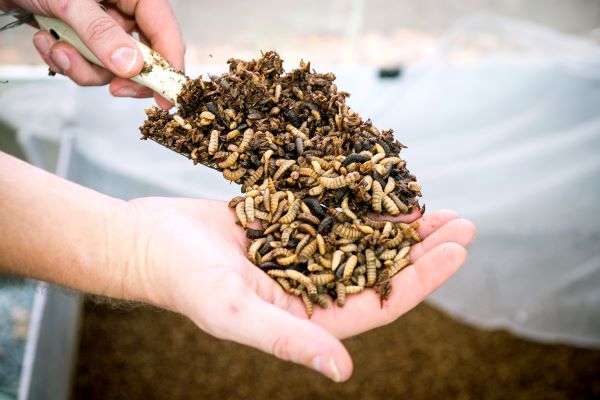Vitalis™ is a patent pending, 100% natural bioactive spray developed by Nutrition Technologies, derived from Black Soldier Fly (BSF) frass that has been fermented and enhanced with additional chitin and a microbial inoculant to create a highly effective plant protection product. The bacterial strain, Bacillus halotolerans was isolated from the BSF larvae itself, and has been shown to inhibit plant pathogens and improve plant drought tolerance. These components work together to enhance the plant’s natural defences against pathogenic microbes, and to create healthy, disease resistant foliage and root zone. Vitalis™ can be used as a foliar spray or root drench on its own, or in combination with Diptia® bioactive fertiliser.
Nutrition Technologies has been working with BSF since 2015, and is the largest tropical
producer of insect-based products in the world. Using Decomposition Ecology principles, we
leverage natural systems to optimise the upcycling of nutrients – working with nature instead of against it. With a team of 20+ scientists, and a dedicated microbiology laboratory we have rigorously tested our products internally and with third parties.
The Product Innovation
Vitalis™ is precisely formulated to prevent fungal disease, boost beneficial microbes and
provide micronutrients to plants. Vitalis™ is derived from enriched Black Soldier Fly (BSF) frass, enhanced with a microbial inoculant and added insect chitin to provide highly effective protection for all kinds of plants. The bacteria, isolated from the larvae digestive system, is proven to inhibit plant pathogens by up to 96%, and the chitin comes from the exoskeleton of the mature larvae.
This added chitin supports the growth of chitin-degrading bacteria in the liquid, particularly
effective at destroying pathogenic fungus. These components work together to enhance the
plant’s natural defences against pathogenic microbes, and to create healthy, disease resistant soil around the plant root zone, protecting against fungal pathogens in the soil.
Conventional solutions and the need for innovation
Conventional disease control measures currently rely on fungicides and aggressive sanitization such as burning the soil. For many fungal pathogens these methods are rarely effective, where they do work they are associated with damaged soils and provide the conditions for the development of fungicide-resistance strains. Vitalis™enhances beneficial microbial activity in the soil, increasing nutrient availability and plant health. One bottle of Vitalis™contains 12 billion beneficial bacteria and applying Vitalis™ is a quick way to improve the microbial profile of soils. The microbial activity leads to increased nutrient absorption through bacteria such as phosphorus solubilizing bacteria and can protect plants from fungal infections.
Multiple modes of action future-proof the performance
Insect frass is a nutrient source for plants in nature where their complex mechanisms benefit from frass. The bacteria in Vitalis™ including Bacillus halototerans, directly inhibit fungal pathogens and stop them from growing, and prevent spores from germinating. They do this using many methods, including the production of enzymes that cut open the fungal cell walls, and the use of Siderophores (molecules that bind to iron), which is needed by the fungi to grow. Limiting the availability of iron to the fungi inhibits its growth.
Tested in both laboratory and field settings
A trial was conducted by Assoc. Prof. Dr. Noor Baity Saidi from the Faculty of Biotechnology and Biomolecular Sciences, Universiti Putra Malaysia (UPM), a plant pathologist and an expert in the fungal pathogen Fusarium sp. She is also a research associate at the Laboratory of Sustainable Agronomy and Crop Protection, Institute of Plantation Studies, UPM. In the trial the plants were infected with Fusarium oxysporum f. sp. cubense tropical race 4 (FocTR4), and where the plants were treated with Diptia® and Vitalis™ only 4% showed any disease symptoms (a 4% disease index score average) compared to 100% for the untreated control. The disease symptoms were reduced by 96% vs untreated plants.
Low energy, sustainable production system
Nutrition Technologies have developed a low-energy tropical production system that uses a
unique combination of micro-organisms and Black Soldier Flies to bioconvert 60,000MT/year of organic by-products into value-added products for livestock and agriculture. As a tropical species, the Black Soldier Fly larvae grow quickly and efficiently in the ambient Malaysian climate, meaning that very little energy is required to grow or breed the flies. This low-energy model means that the company benefits from a very low cost of production, but with the same high standards as any European or North American manufacturer, and is able to pass-on those savings to the customer. This makes Nutrition Technologies’ products some of the most competitively priced insect products in the world, without compromising on quality or safety. The company currently ships industrial volumes of material throughout Asia, North & South America and Europe, from the two hectare factory in southern Malaysia.
“This is the second of two plant health products we have launched this year ” said Nick Piggott, Co-CEO, Nutrition Technologies. “Understanding how disease prevention using liquid products can effectively complement existing fertilisation programmes has helped us find a critical niche in industrial agriculture. . Vitalis™ directly addresses two of the most economicall dangerous plant pathogens in the world – Ganoderma in oil palms and Fusarium oxysporum in bananas. Both of these diseases have the potential to wreak havoc on the global food supply chain if left unchecked, so the release of Vitalis™ is a massive step forward in securing the future supply of these two staple crops”.
The insect sector has gathered increasing attention over the past few years, with the global
insect protein market alone estimated to be worth US$343 million in 2021, and expected to grow with a CAGR of 26.49% to reach US$1.3 billion by 2027. As a sustainable solution to help minimise multiple unsustainable practices, the sector as a whole has seen investments totalling nearly US$1 billion.








